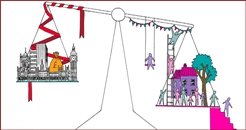 Shifting the Balance: Local adaptation, innovation and collaboration
Shifting the Balance: Local adaptation, innovation and collaboration
From a report by New Local
New Local have published Shifting the Balance - research with public and third sector leaders across England, Wales and Scotland exploring how councils and communities joined together to fight Covid-19. And it sets out recommendations for how to take forward the adaptation, innovation and collaboration that emerged during this time of crisis.
2020 was a year with unprecedented challenges for so many, and it was also the year that proved community power is possible at scale. Public services and communities came together to help each other as never before. The community power movement that responded to the immediate crisis of the Covid-19 pandemic broke down institutional barriers, disrupted hierarchies and, most crucially, produced tangible results.
Shifting the Balance is an investigation into this new community-powered approach, where people across localities worked together to achieve shared objectives as the Covid-19 crisis unfolded.
Faced with the overwhelming challenge of the pandemic, our councils, civil society organisations, community groups and businesses adopted many new cooperative approaches at high speed. Though people who were already struggling socially and economically were disproportionately impacted by the crisis, in many places the new approach saw proactive efforts to reach communities and individuals with less voice and access to services.
As a result, huge numbers of people across the country mobilised to help those in need and felt closer to their neighbours, local community and local area. The viability and value of community power was tested in ways unimaginable before the pandemic hit. It is now important to understand what happened in order to retain what worked for greater resilience in the future.
There are many case studies in the report which makes recommendations for national governments, local authorities and other public service bodies, Voluntary Community and Social Enterprise organisations and communities to sustain the new community-powered approach:
Adaptation
-
Proactively identify, map and embed new practices. Public services, community organisations and communities should work together to record and cultivate effective community-powered approaches across whole localities as we turn toward recovery.
-
Build more meaningful connections with communities. Local public services should maintain the more proactive, inclusive and collaborative style of engagement that we witnessed during the first lockdown.
-
Resource the community’s core assets. National governments should devolve funding locally to support community power and infrastructure, alongside national and local public services creating opportunities for communities to participate directly in decisions about resource allocation.
Innovation
-
Normalise digital inclusivity. Local public, education, business and VCSE partners should work together to assess and address digital skills and equipment needs in their place. National governments should commit funding to support place-based initiatives.
-
Embed structural long-termism and community planning at the national level. The UK Government should table a Community Power Bill to strengthen community rights and participation in public services in England. The Cabinet Office should lead both the development of the Bill and the shift towards a more long-termist policymaking environment in Whitehall.
-
Facilitate informal community-led approaches. Public services should support local community groups and frontline public servants to navigate formal bureaucratic processes and enable them to carry out their work with autonomy and agility.
Collaboration
-
Build a unifying narrative and vision for the whole locality. Local public services, cross-sector organisations and communities should serve as equal partners and co-authors to a shared narrative capturing their place’s story of the Covid-19 crisis and ambitions for the future.
-
Establish spaces and networks for communities and the third sector. Local public services should support rather than manage charity and community networks to encourage joined-up working across a place and data-sharing where appropriate.
-
Incentivise cooperation, not competition. Local and national government should adopt community commissioning and social value procurement to galvanise meaningful partnerships and trusting, collaborative behaviours across localities.
The new community-powered approach that emerged in response to the pandemic was the product of localities finding the best possible ways to respond collectively to a crisis. It was self-evidently the most natural and effective model to adopt in the midst of a pandemic. This is telling.
The report shows that through adopting community-powered approaches, public services were able to empower frontline workers, set up community hubs to coordinate local responses, and rely on communities to help vulnerable people with much more than shopping and collecting prescriptions.
Read the report here.
Retweet about this article:
From a report by New Local, 16/03/2021